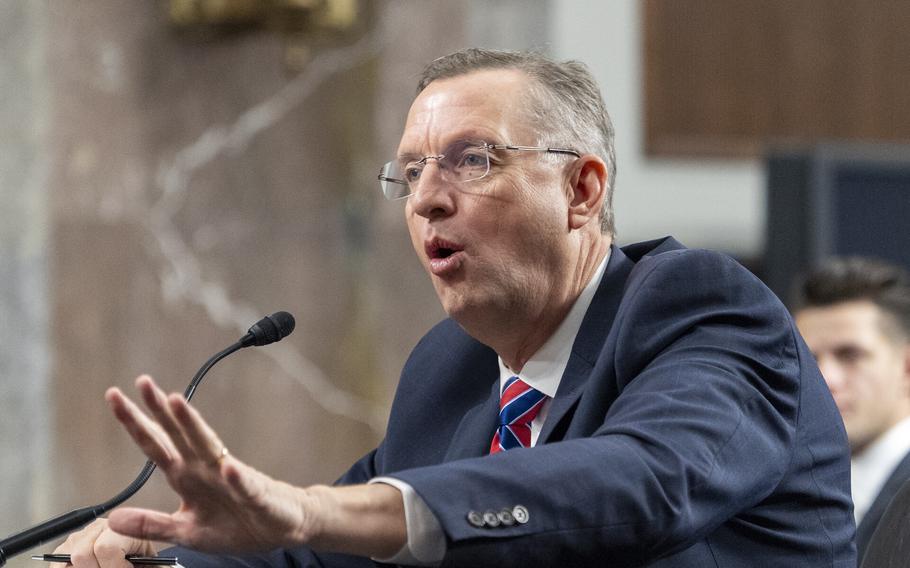
Department of Veterans Affairs Secretary Doug Collins, pictured in January at a Senate hearing, said in March that the VA was ending health care and coverage for gender dysphoria and veterans seeking transgender-related medical treatments “will have to do so on their own dime.” (Eric Kayne/Stars and Stripes)
WASHINGTON — A transgender Army veteran whose hormone therapy was halted by the Department of Veterans Affairs has filed a lawsuit in federal court challenging the VA’s ban on gender-affirming care.
The veteran — identified as “Jane Doe” in the lawsuit — filed a petition Monday in U.S. Court of Appeals for Veterans Claims in Washington, arguing the VA’s denial of her hormone treatment violates the Constitution and anti-discrimination laws.
Attorneys for the veteran plan to seek class-action status for the case, according to the lawsuit.
The veteran is seeking the immediate resumption of gender-affirming care for herself and other veterans similarly affected, according to the Veterans Legal Services Clinic at Yale Law School, which is representing the veteran.
“The VA’s rescission of medically recommended and necessary care for eligible transgender veterans is unsupported by science, unjustified by policy and utterly irrational,” the lawsuit said.
The transgender veteran served in the Army from 2006 to 2008 and the Army National Guard from 2016 to 2025. She left the military with an honorable discharge in January. But while serving in the National Guard in 2017, the veteran was diagnosed with gender dysphoria and began hormone treatments, which continued for the next eight years, according to the lawsuit.
Gender dysphoria is the medical term for individuals whose gender identity does not match biological sex at birth. Hormone therapy is standard treatment for gender dysphoria.
However, when the veteran sought to continue hormone treatments after leaving military service, the VA denied the request, according to the lawsuit.
Veterans seeking transgender-related medical treatments “will have to do so on their own dime,” VA Secretary Doug Collins said when he announced in March that the VA was ending health care and coverage for gender dysphoria.
The ban on transgender-related care at the VA was enacted after President Donald Trump issued an executive order that withdrew federal recognition for transgender people and directed an end to gender-affirming care, the lawsuit stated.
“This is discrimination, plain and simple,” said Donovan Bendana, a spokesman with the Veterans Legal Services Clinic.
Transgender veterans seeking care at the VA are “labeled as second-class citizens by the very system meant to care for them,” Bendana said.
The veteran’s doctors and clinicians who reviewed her medical records “agree that interruption of her hormone treatment will be catastrophic for her physical and mental health,” the lawsuit said.
The veteran, who has a diagnosis of post-traumatic stress disorder and receives disability compensation, relies on the VA for all her health care, according to the lawsuit.
“When I separated from the Guard earlier this year with a 100% service-connected disability rating, my understanding was that VA would fulfill its obligation of providing medical care similar to my care while in service,” the veteran said in a statement provided by her attorneys. “As a veteran, I am now subject to less coverage for medically necessary medication. Due to service-connected disabilities, I am unable to work or pay for the medication myself. Without coverage through the VA, I am out of options.”
In 2021, the veteran underwent surgery that “altered her sex organs,” which affected her ability to produce sex hormones, according to the lawsuit. Hormone therapy treatments are necessary to replace the hormones that her body no longer makes.
“Abrupt withdrawal of these hormones for transgender individuals who, like the petitioner, have undergone a gonadectomy contradicts widely accepted medical standards of care,” the lawsuit said. “Without these hormones, [the] body cannot regulate essential processes, which may lead to severe or life-threatening consequences.”